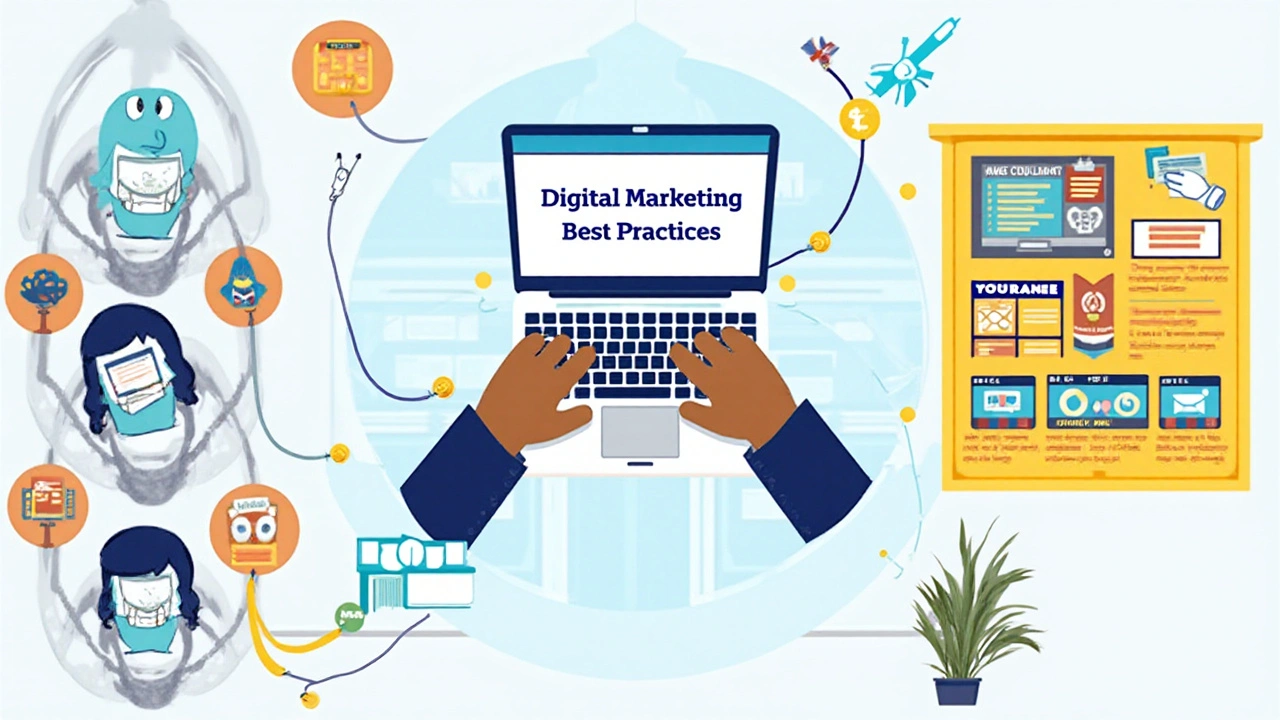Mastering Internet Marketing: Essential Strategies for Success

In the ever-evolving world of business, mastering internet marketing has become a crucial component for success. As technology reshapes how consumers interact with brands, understanding the digital space is more important than ever. This guide aims to unravel the complex world of internet marketing and equip you with the foundational knowledge needed to thrive online.
Whether you're a budding entrepreneur or a seasoned business owner, gaining insight into internet marketing strategies can make a significant difference. We'll explore various aspects, from what makes SEO indispensable to how social media can elevate your brand's visibility. Expect to find actionable advice throughout, geared towards enhancing your digital presence.
Internet marketing is not just about being online; it's about being effective online. So, let's get started on this journey to understanding the nuts and bolts of internet marketing and how it can help your business grow.
- Understanding SEO and Its Importance
- The Role of Social Media Marketing
- Effective Content Marketing Strategies
- Leveraging Pay-Per-Click Advertising
Understanding SEO and Its Importance
In the digital marketing landscape, SEO, or Search Engine Optimization, is quite literally a game-changer. Envision your business as a book in the colossal library of the internet. SEO ensures your book is easily found and frequently borrowed. It’s all about visibility yet it delves much deeper than just appearances. Successful SEO requires carefully crafted strategy, based on understanding search engine algorithms and user behavior. Keywords play a vital role, serving as a bridge between the content you've created and the users searching for it. With effective SEO, not only can you enhance your website's ranking, but also drive high-quality traffic, giving a definitive edge over competitors who might still be scrambling with traditional marketing tactics.
SEO has evolved leaps and bounds over the years. Gone are the days when keyword stuffing and link farms reigned supreme. Today, search engines consider a plethora of factors to rank a website. It's about relevance, authority, and user experience. Engines like Google employ sophisticated algorithms that assess a site’s quality and relevance to specific keywords. Factors like page load speeds, mobile accessibility, and even content updates contribute to your site’s ranking too. According to a recent analysis by Backlinko, pages that load faster often rank higher, underscoring how technical aspects of SEO can influence algorithms.
"SEO isn't about gaming the system anymore; it's about learning how to play by the rules." - Christina Anderson, SEO Specialist
Content is another cornerstone of digital strategy within SEO. Search engines prioritize content that thoroughly responds to questions posed by users. Blogs, articles, infographics, and videos - all play roles. Crafting valuable content that speaks to your audience’s needs not only attracts visitors but also keeps them engaged, reducing bounce rates. Long-form content, rich with relevant keywords, tends to build authority and trust with audiences and search engines alike. Regular updates with fresh content further signal to search engines that your site is alive and worth visiting regularly.
The importance of backlinks can’t be stressed enough either. They’re akin to votes of confidence from other sites. If reputable sites link to yours, it suggests to search engines that your site has quality content. However, all backlinks are not created equal. Quality is key; a dozen links from shady, low-authority sites won't hold a candle to a single link from a respectable, high-authority source. Hence why forging genuine partnerships and connections in your industry can have far-reaching positive effects.
SEO is not a one-time project; it's an ongoing process that requires regular audits and updates. Monitoring tools like Google Analytics and Search Console can provide invaluable insights into your performance. Identifying which keywords drive traffic, which pages garner more attention, and how users interact with them allows for data-driven decisions. These insights can spearhead your content direction and broader marketing strategies.
For those still new to managing SEO, numerous resources are available, from comprehensive online guides to SEO services offered by professionals. Given its pivotal role in digital marketing, understanding and investing in SEO can pay rich dividends. As digital transformation continues, the weave of search engines and user behavior only grows more intricate. But by mastering SEO, you can ensure your business not only survives but thrives in this ever-expanding digital universe.

The Role of Social Media Marketing
Social media marketing has revolutionized the way businesses communicate and engage with their audiences. The role it plays in modern marketing strategies is profound, offering an unparalleled opportunity to connect with customers on a personal level. By leveraging platforms such as Facebook, Instagram, Twitter, and LinkedIn, brands can showcase their personalities, values, and products in a way that's accessible and interactive. This accessibility encourages genuine engagement, helping to build trust and loyalty among existing and potential customers. With millions of users logging into these platforms daily, businesses can reach an international audience without the need for physical presence.
Understanding how each social media platform works is crucial for maximizing the potential of social media marketing. Each platform has its unique features and user demographics, requiring tailored content strategies. For instance, Instagram's visual nature makes it ideal for brands that rely on imagery to sell their products, such as fashion and food, while LinkedIn focuses on a more professional tone, excellent for B2B businesses. Internet marketing success largely depends on identifying the platform that suits your business objectives and honing in on the content that resonates with that audience. Consistently delivering quality, engaging posts not only boosts visibility but positions the brand as an industry leader.
Social media marketing goes beyond merely posting updates and replying to comments. It's about creating a community around your brand. In 2023, a study found that 72% of consumers who had a positive experience with a brand on social media were likely to recommend it to others. This highlights the power of social media in generating word-of-mouth promotion. Brands can nurture these conversations by encouraging user-generated content, where customers share their experiences or uses of a product, often leading to authentic and impactful endorsements. These interactions humanize the brand and cultivate a sense of belonging among followers.
"Companies that engage meaningfully on social media platforms grow revenue streams twice as fast as those that do not." — McKinsey Digital
Effective social media campaigns often incorporate the latest technologies and trends. The integration of artificial intelligence in chatbots, for instance, facilitates immediate customer service responses, enhancing customer satisfaction. Additionally, video content has seen a rise in engagement rates across all platforms; live streaming on platforms like Facebook Live or Instagram Live allows businesses to reach their audience in real-time, giving a face and voice to otherwise static brand names. The proverbial saying "content is king" stands truer than ever on social media, where the quality of content determines engagement levels and, consequently, the success of the digital strategy.
Measuring Success in Social Media Marketing
For any strategy to be effective, measuring its success is essential. Social media marketing is no different. Utilizing analytics tools provided by the platforms can give valuable insights into how users interact with your content. Metrics such as reach, impressions, likes, shares, and engagement rates offer a window into what's working and what might need a tweak. This data-driven approach allows businesses to fine-tune their strategies, ensuring they remain aligned with audience interests and behaviors.
To summarize, social media marketing is a dynamic, vibrant aspect of the digital marketing world. It requires creativity, adaptability, and a clear understanding of your audience's needs and preferences. When done right, social media can provide an incredible return on investment, driving both brand awareness and loyalty. For businesses today, seizing the immense opportunities presented by online advertising and social media platforms is not just beneficial but essential.

Effective Content Marketing Strategies
Creating impactful content is more than just a buzzword in the realm of internet marketing. It is a vital strategy that bridges the gap between a business and its target audience. To harness the true power of content marketing, one must first understand its core components and how they interact. Content isn't merely about promoting products or services; it goes further to build relationships with consumers. This nurturing of trust and loyalty is achieved through consistently delivering valuable information that consumers crave. Over time, businesses see that well-crafted content translates into higher engagement rates and, ultimately, increased sales.
In today's fast-paced digital environment, a variety of content forms cater to diverse preferences. Blogs, for example, offer in-depth knowledge on topics relevant to your audience, establishing your brand as an authoritative voice in the industry. Meanwhile, visual content like infographics and videos capture attention more swiftly and are especially effective on social media platforms. To maintain a competitive edge, it's crucial for content to not only resonate with audiences but also align with current trends and interests. Content marketers must also leverage analytical tools to understand which content performs best, refining their approach continually.
Storytelling remains a timeless method in digital strategy, as it draws emotional connections and keeps the audience engaged. Brands often use narratives to illustrate their values and mission, making their products relatable on a human level. Sometimes, the simplest stories have the greatest impact, as they break down complex ideas into relatable experiences. In fact, HubSpot notes that content marketing leaders experience nearly eight times more site traffic than non-leaders
"including your audience in your story is not just creating brand followers; it's creating brand advocates."
A successful online advertising strategy involves optimizing content for search engines. By focusing on effective SEO tactics, content creators can ensure their material ranks high on search results, making it easier for potential customers to discover. This includes researching keywords, using them naturally within the content, and employing meta tags that enhance visibility. Moreover, backlinks from reputable sites further bolster content reliability and search engine performance, creating a cycle of sustained traffic growth.
Additionally, consistent publishing schedules and diverse content formats maintain audience interest. A well-crafted editorial calendar that balances written pieces, visuals, and interactive elements helps achieve a well-rounded digital presence. Crafting quality content is only part of the equation; promoting it across multiple channels ensures it reaches the widest audience possible. By integrating social media platforms with your strategy, content can be shared, liked, and commented on, fostering a community of engaged users.

Leveraging Pay-Per-Click Advertising
Harnessing the power of Pay-Per-Click Advertising (PPC) can dramatically increase your business visibility online, driving targeted traffic to your website. Conceived as one of the most effective forms of internet marketing, PPC allows businesses to bid for ad placements in search engines’ sponsored links when a specific keyword is searched, which in turn amplifies their reach. This means when done right, PPC can put your business directly in front of audiences actively seeking your product or service, providing a significant edge in the digital marketplace.
Google Ads is the most commonly used PPC advertising system, offering an impressive platform where users can earn a considerable return on investment. Understanding the inner workings of PPC requires diving into the details of quality scores, bid amounts, and ad ranks that determine where and how your ads appear. Strategies such as keyword research and targeting play crucial roles in shaping the effectiveness of your campaigns. Identifying the right keywords ensures that you’re reaching people interested in what you’re offering, while negative keywords prevent unrelated traffic, saving money and improving conversion rates.
Consider this compelling fact: businesses make an average of $2 in revenue for every $1 they spend on Google Ads.
“The beauty of PPC lies in its precision. Every click is a step closer to converting a searcher into a customer.” — Neil PatelWith such a significant potential for returns, it’s not surprising PPC has become a staple in digital strategies across numerous industries. But the magic of PPC doesn’t stop at just driving clicks; it’s equally about optimizing and measuring these results. Once you have your campaigns set up, the real game is played in the analytics. By utilizing conversion tracking and other metrics, businesses can fine-tune their ads to better suit consumer behavior, ensuring that every dollar spent pushes towards achieving specific business goals.
The essential advantage of PPC is the control it gives advertisers over budget and targeting. You can set daily and monthly budgets that prevent overspending while targeting options allow ads to be delivered based on location, device, time, and even previous interactions with your website. These laser-focused targets make PPC a flexible tool tailored to individual business models. For example, local businesses can use location targeting to ensure their ads appear to customers within a certain area, maximizing the relevance and impact of each ad.
Let's glance at some quick tips to optimize PPC campaigns:
- Ad Extensions: Utilize these to add more information to your ads and improve click-through rates.
- A/B Testing: Continuously test different ad target groups, wording, and visuals to see what resonates best with your audience.
- Quality Score: Pay attention to this metric, as a higher quality score can lead to lower costs per click and better ad positions.
- Landing Page Relevance: Make sure your landing page aligns well with the advert content to improve user experience and conversion rates.



